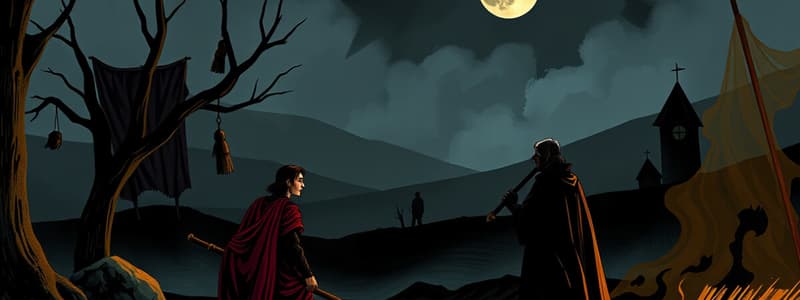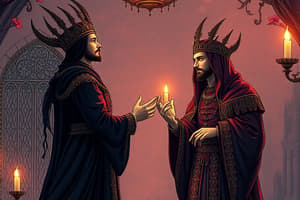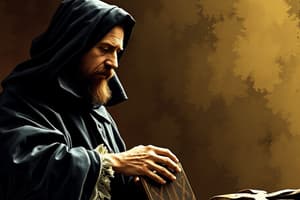Podcast
Questions and Answers
What happens in Act 1 scene 2?
What happens in Act 1 scene 2?
King Duncan hears reports of the battle
Who are the Scottish army led by?
Who are the Scottish army led by?
Macbeth and Banquo
Who are the Scottish army fighting?
Who are the Scottish army fighting?
Rebel armies from Norway and Ireland
How does Shakespeare contrast the eerie opening scene?
How does Shakespeare contrast the eerie opening scene?
What mood does the battlefield scene set for the rest of the play?
What mood does the battlefield scene set for the rest of the play?
How do the captain and Duncan describe Macbeth?
How do the captain and Duncan describe Macbeth?
What is Macbeth celebrated for?
What is Macbeth celebrated for?
What was the traitor's name?
What was the traitor's name?
What did Macbeth do to the traitor Macdonald?
What did Macbeth do to the traitor Macdonald?
What eventually leads to Macbeth's downfall?
What eventually leads to Macbeth's downfall?
What does Macbeth cutting off the traitor's head do?
What does Macbeth cutting off the traitor's head do?
Flashcards are hidden until you start studying
Study Notes
Key Events in Act 1 Scene 2
- King Duncan receives reports about the ongoing battle, indicating the harsh realities of war.
- Macbeth and Banquo lead the Scottish army against formidable rebel forces.
Characters in Conflict
- The Scottish army is engaged in combat with rebel armies from Norway and Ireland, highlighting the external threats to Scotland.
Contrast in Atmosphere
- Shakespeare skillfully contrasts the eerie opening scene with the violent and gruesome atmosphere on the battlefield, showcasing the duality of the play's themes.
Mood Setting
- The brutal battlefield scene establishes a violent mood that permeates throughout the rest of the play, foreshadowing future events.
Descriptors of Macbeth
- Macbeth is portrayed by both the captain and King Duncan as exceptionally brave and valiant, positioning him as a heroic figure early in the narrative.
Macbeth’s Reputation
- Macbeth is celebrated not only for his bravery but also for his ruthless, bloodthirsty nature, indicating a complex character who embodies both valor and violence.
Key Adversary
- The primary traitor in the conflict is Macdonald, representing treachery against King Duncan.
Macbeth's Actions
- In a climactic moment, Macbeth brutally kills the traitor Macdonald, described vividly as cutting him "from the nave to the chops," underscoring his ferocity in battle.
Foreshadowing and Themes
- Macbeth's act of beheading Macdonald serves as foreshadowing of his eventual downfall, suggesting that his violent actions will lead to his own demise.
Consequences of Violence
- The play illustrates that the violence portrayed in Act 1 Scene 2 ultimately acts as a precursor to Macbeth's tragic fate, reinforcing the theme of violence leading to ruin.
Studying That Suits You
Use AI to generate personalized quizzes and flashcards to suit your learning preferences.




